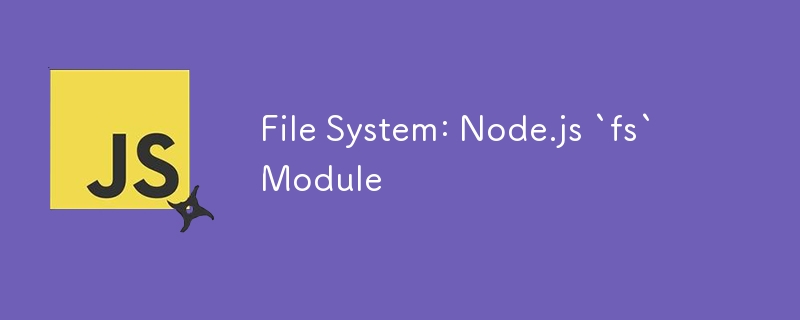Home >Web Front-end >JS Tutorial >File System: Node.js `fs` Module
File System: Node.js `fs` Module
- WBOYWBOYWBOYWBOYWBOYWBOYWBOYWBOYWBOYWBOYWBOYWBOYWBOriginal
- 2024-08-24 15:01:33494browse

The fs (File System) module in Node.js is a powerful tool for working with the file system, allowing you to interact with files and directories on your server. It's built into Node.js, so you don't need to install anything extra to use it. Let's explore how fs works and its key functions.
1. What is the fs Module?
The fs module provides an API for interacting with the file system in a manner closely modeled around standard POSIX functions. This module is used for tasks like reading from and writing to files, creating directories, and more.
2. Basic Setup
To use the fs module, you need to require it at the beginning of your Node.js script:
const fs = require('fs');
3. Reading Files
There are two primary ways to read files: asynchronously and synchronously.
Asynchronous Reading
This method is non-blocking, meaning it won't stop the execution of your program while it reads the file.
fs.readFile('example.txt', 'utf8', (err, data) => {
if (err) {
console.error(err);
return;
}
console.log(data);
});
- 'example.txt': The file you want to read.
- 'utf8': Specifies the encoding to be used.
- Callback Function: Handles the error and the file data.
Synchronous Reading
This method is blocking, meaning it will stop the execution of your program until the file is read.
try {
const data = fs.readFileSync('example.txt', 'utf8');
console.log(data);
} catch (err) {
console.error(err);
}
4. Writing Files
Similar to reading files, writing can also be done asynchronously or synchronously.
Asynchronous Writing
fs.writeFile('example.txt', 'Hello, World!', (err) => {
if (err) {
console.error(err);
return;
}
console.log('File has been saved!');
});
Synchronous Writing
try {
fs.writeFileSync('example.txt', 'Hello, World!');
console.log('File has been saved!');
} catch (err) {
console.error(err);
}
5. Appending to Files
If you want to add content to an existing file without overwriting it, use the appendFile method.
Asynchronous Appending
fs.appendFile('example.txt', '\nAppended Content', (err) => {
if (err) {
console.error(err);
return;
}
console.log('Content has been appended!');
});
Synchronous Appending
try {
fs.appendFileSync('example.txt', '\nAppended Content');
console.log('Content has been appended!');
} catch (err) {
console.error(err);
}
6. Deleting Files
To delete a file, use the unlink method.
Asynchronous Deletion
fs.unlink('example.txt', (err) => {
if (err) {
console.error(err);
return;
}
console.log('File deleted!');
});
Synchronous Deletion
try {
fs.unlinkSync('example.txt');
console.log('File deleted!');
} catch (err) {
console.error(err);
}
7. Working with Directories
Creating a Directory
fs.mkdir('newDir', { recursive: true }, (err) => {
if (err) {
console.error(err);
return;
}
console.log('Directory created!');
});
Reading a Directory
fs.readdir('newDir', (err, files) => {
if (err) {
console.error(err);
return;
}
console.log('Files in directory:', files);
});
Deleting a Directory
fs.rmdir('newDir', { recursive: true }, (err) => {
if (err) {
console.error(err);
return;
}
console.log('Directory deleted!');
});
8. Watching Files
You can watch for changes in a file using the fs.watch method:
fs.watch('example.txt', (eventType, filename) => {
if (filename) {
console.log(`${filename} file Changed!`);
}
});
9. Working with Streams
Node.js provides fs streams for handling large files that may not fit into memory.
Reading with Streams
const readStream = fs.createReadStream('example.txt', 'utf8');
readStream.on('data', (chunk) => {
console.log(chunk);
});
Writing with Streams
const writeStream = fs.createWriteStream('example.txt');
writeStream.write('Hello, ');
writeStream.write('World!');
writeStream.end();
10. Copying Files
Node.js provides a simple method for copying files:
fs.copyFile('source.txt', 'destination.txt', (err) => {
if (err) {
console.error(err);
return;
}
console.log('File copied successfully!');
});
11. Promisified fs
The fs module also has promise-based methods, making it easier to work with modern JavaScript features like async/await.
const fsPromises = require('fs').promises;
async function readFile() {
try {
const data = await fsPromises.readFile('example.txt', 'utf8');
console.log(data);
} catch (err) {
console.error(err);
}
}
readFile();
12. Practical Use Cases
- Configuration Files: Read or write configuration files (e.g., JSON files) to store settings.
- Log Files: Append to log files to keep track of application events.
- File Uploads: Store and retrieve uploaded files.
- Data Processing: Read, process, and write large datasets efficiently using streams.
13. Error Handling and Best Practices
- Always handle errors in callback functions or use try-catch blocks with synchronous code.
- Use asynchronous methods for better performance in most cases.
- Consider using fs.promises for cleaner, more modern code.
- Be cautious with synchronous methods as they can block the event loop.
- Use fs.constants for file system flags (e.g., fs.constants.O_RDONLY for read-only access).
14. Security Considerations
- Validate and sanitize file paths to prevent directory traversal attacks.
- Be cautious when working with user-supplied filenames or paths.
- Use appropriate file permissions when creating or modifying files and directories.
15. Conclusion
The fs module is versatile and essential for any Node.js application that needs to interact with the file system. By understanding its various methods, handling streams efficiently, and employing best practices, you'll be well-equipped to manage file operations in Node.js effectively and securely.
Remember to consult the official Node.js documentation for the most up-to-date information and additional features of the fs module.
The above is the detailed content of File System: Node.js `fs` Module. For more information, please follow other related articles on the PHP Chinese website!
Related articles
See more- An in-depth analysis of the Bootstrap list group component
- Detailed explanation of JavaScript function currying
- Complete example of JS password generation and strength detection (with demo source code download)
- Angularjs integrates WeChat UI (weui)
- How to quickly switch between Traditional Chinese and Simplified Chinese with JavaScript and the trick for websites to support switching between Simplified and Traditional Chinese_javascript skills

